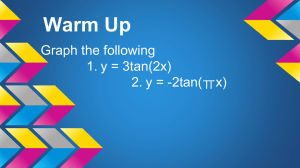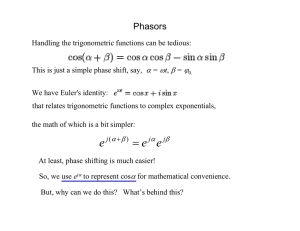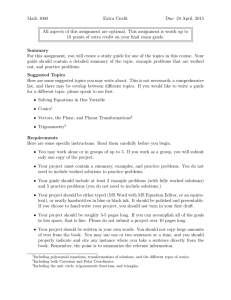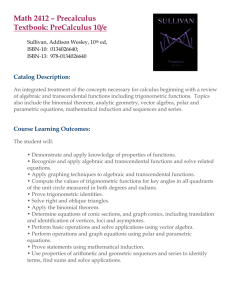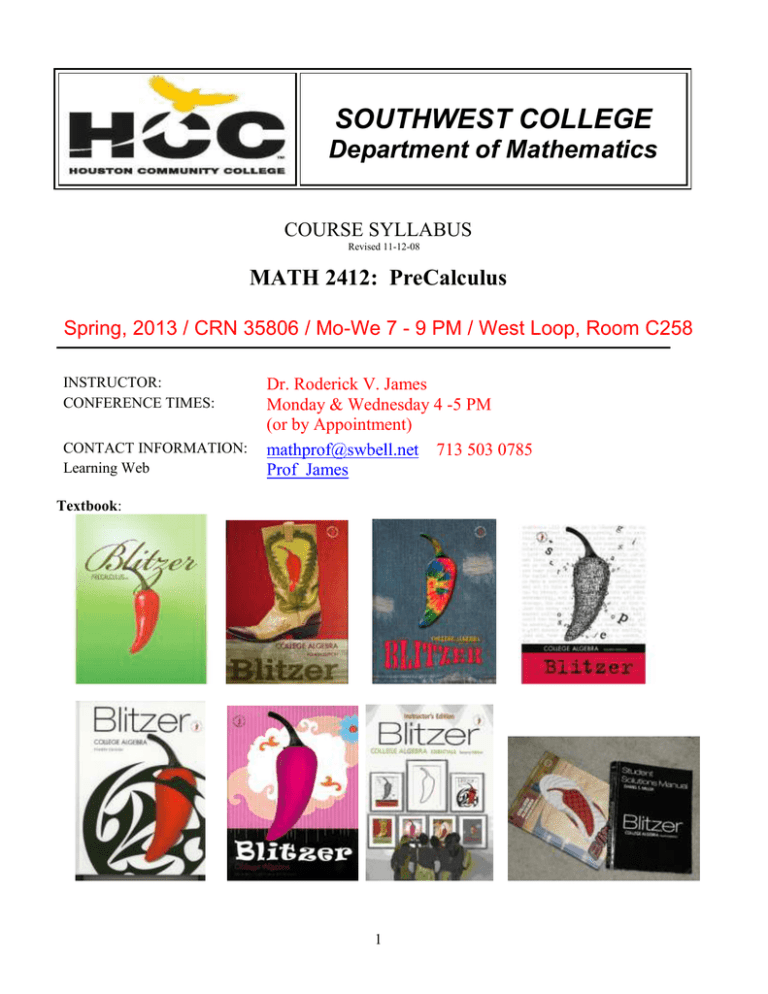
SOUTHWEST COLLEGE
Department of Mathematics
COURSE SYLLABUS
Revised 11-12-08
MATH 2412: PreCalculus
Spring, 2013 / CRN 35806 / Mo-We 7 - 9 PM / West Loop, Room C258
INSTRUCTOR:
CONFERENCE TIMES:
CONTACT INFORMATION:
Learning Web
Dr. Roderick V. James
Monday & Wednesday 4 -5 PM
(or by Appointment)
mathprof@swbell.net 713 503 0785
Prof James
Textbook:
1
Precalculus: Robert Blitzer, Fourth Edition, 2010, Pearson Prentice Hall
· ISBN-10: 0321559843
· ISBN-13: 978-0321559845
Catalog Description:
PreCalculus. Topics include elementary theory of functions and equations, analytic geometry, vectors,
introductory logic, mathematical induction, sequences and finite series.
Prerequisite:
Math 1314: Pass with “C” or better
Math 1316: Pass with “C” or better
Credits:
4 credit hours (4 Lecture).
Student Learning Outcomes
1. Represent and manipulate algebraic and
trigonometric functions and relations
algebraically, graphically, and
numerically, including partial fraction
decomposition and finding zeroes of
functions.
Course Objectives
1.1 Develop and use various problem-solving
techniques.
1.2 Recognize functions as ordered pairs.
1.3 Determine the graph of an algebraic equation or
function.
1.4 Understand synthetic division.
1.5 Develop partial fraction decomposition.
1.6 Find the zeros of real functions
1.7 Solve polynomial equations.
1.8 Utilize the six basic trigonometric functions.
2. Engage in algebraic and trigonometric
problem solving and modeling.
2.1 Apply the Law of sines and the Law of cosines for
various types of situations.
3. Synthesize algebraic and trigonometric
facts and laws into proofs.
3.1 Verify various trigonometric identities.
3.2 Find the powers and roots of complex numbers
using DeMoivre’s Theorem.
4. Analyze and manipulate equations
between various two dimensional
systems such as rectangular, polar,
vector representations, conic systems
and axes manipulations, as well as
solving equations in these systems.
4.1 Understand basic vectors (2 dimensional).
4.2 Convert points in a rectangular coordinate system
to polar coordinates.
4.3 Recognize algebraic formulas relating to circles,
parabolas, ellipses, and hyperbolas.
4.4 Use translation of axes, rotation of axes, and polar
equations of conics.
5. Investigate and perform summations and
predictions on geometric, algebraic and
binomial sequences and series.
5.1 Recognize the use of arithmetic and geometric
sequences.
5.2 Use summation notation to represent a series.
5.3 Understand and use the Binomial theorem.
5.4 Understand mathematical induction.
5.5 (Optional) Understand the basic concepts of limits.
2
Course Intent:
This course is intended primarily to prepare students for calculus. It can also be used for general
mathematics credit.
Audience: This course is for students who need a background for taking a beginning calculus course.
Testing policy:
There will be THREE (3) tests during the semester. The test will be ONE hour long in class
CLOSED Book. Each test will contain 20 problems (after the style of the Final). The test will be
at the end of class. The first part of the class will be a review of the test material. The test dates
are:
Monday Feb, 25, 2013
Monday Apr 1, 2013
Monday Apr 29, 2013
FINAL EXAM Date: Wednesday May 8 at 7:30 PM.
If you perform below your expectations or fail any test, please set-up a conference with me as
soon as possible.
Make-up
There will be NO make-up exams.
Withdrawal from Class:
The last day to withdraw from (drop) this class is
Monday April 1, 2013 at 4:30 PM.
After that date you cannot be given a course grade W.
Grading policy:
Your final course grade is based on the following standard HCC scale.
FINAL AVERAGE
FINAL COURSE GRADE
90 ≤ Average ≤ 100%
A
80 ≤ Average < 90%
B
70 ≤ Average < 80%
C
60 ≤ Average < 70%
D
Average < 60%
F
3
Your course grade will depend on your performance throughout the semester. Your final course grade will
be the weighted average of THREE tests and the FINAL examination. The weights for the two parts of
the course are shown in the example below.
Name
Points
Weights
Weighted
Points
Adam
Stacy
Micah
Cass
Flo
Test 1
100
20%
Test 2
100
20%
Test 3
100
20%
Final
200
40%
Average
500
100%
20
20
20
80
140
90
85
70
60
50
95
85
75
65
45
85
80
70
60
60
185
165
145
130
120
91.43%
82.86%
72.14%
63.57%
56.43%
Letter
Grade
A
B
C
D
F
Final Examination:
There will be a comprehensive final exam given at the end of the semester. The final will consist of 40
questions covering the entire course. The final is MANDATORY for all students who make less than 80%
on the homework.
Homework policy:
Homework will be assigned each week and discussed, as needed, in class. Homework will be graded.
Each student is responsible for the completion and understanding of the homework assignments. Class
discussion time and conference hours can be used to obtain help when having difficulties with the
material. Homework is essential to the understanding of the material. Homework problems are posted on
the Learning Web.
Homework for each week is due on the Monday of the following week at the start of class. Homework
will NOT be accepted after the end of class on Monday.
If you get 80% of the homework correct your FINAL will be optional. An 80% score on the Homework
means that your performance on the final will NOT hurt your course grade.
Practice is essential to the mastery of mathematics; the assigned homework provides the necessary
practice. At the beginning of each class, be prepared to ask questions about any problems that you are
unable to work or any material in the textbook that you do not understand.
Tests will be given over the assigned homework. As part of your homework, be sure to read the next
section(s) to be covered in class.
.
Calculators:
Graphing or Scientific calculators may be used for class work and also on all exams.
Cell phones will NOT be permitted as calculators during tests. In fact cell phone use during tests is strictly
forbidden.
4
Attendance policy:
Attendance is checked during every class. The instructor WILL drop you for excessive absences.
Tardiness policy:
Roll will be taken TWICE per class. The first roll call will be at the start of class and the second will be an
hour later. If you are absent for EITHER of these roll calls you will be deemed to have missed class.
Therefore, a class period will be added to your missing attendance. The ONLY exception to this rule will
be written permission by me, BEFOREHAND. Email will be accepted as written permission but the email
must be time stamped before class starts!
Withdrawal policy:
If you decide to drop the class, then IT IS YOUR RESPONSIBILITY TO DROP before the final
drop date. If your name is on the roll at the end of the term, you WILL receive a grade. Neither you
nor your instructor will be able to perform the drop after the final drop date. In order to withdraw from
your class and receive a “W” on your transcript, you MUST contact your professor or a counselor
PRIOR to the withdrawal deadline. The Final Withdrawal Deadline is Monday April 1st , 2012 at
4:30 pm. After the withdrawal deadline has passed, you will receive a grade. Zeros averaged in for
required coursework that is not submitted will lower your semester average significantly, most likely
resulting in a failing grade of “F”. Please refer to the following notice before dropping the class.
FINAL GRADE OF FX
Students who stop attending class and do not withdraw themselves prior to the withdrawal
deadline may either be dropped by their professor for excessive absences or be assigned the
final grade of “FX” at the end of the semester. Students who stop attending classes will receive a
grade of “FX”, compared to an earned grade of “F” which is due to poor performance. Logging
into a DE course without active participation is seen as non-attending.
Please note that HCC will not disperse financial aid funding for students who have never
attended class. Students who receive financial aid but fail to attend class will be reported to the
Department of Education and may have to pay back their aid. A grade of “FX” is treated exactly
the same as a grade of “F” in terms of GPA, probation, suspension, and satisfactory academic
progress
EGLS3 -- Evaluation for Greater Learning Student Survey System
At Houston Community College, professors believe that thoughtful student feedback is
necessary to improve teaching and learning. During a designated time, you will be asked to
answer a short online survey of research-based questions related to instruction. The anonymous
results of the survey will be made available to your professors and division chairs for continual
improvement of instruction. Look for the survey as part of the Houston Community College
Student System online near the end of the term.
NOTICE: Students who take a course three or more times will face significant tuition or
fee increases at HCC and other Texas public colleges and universities. In addition, state law
allows students a maximum of 6 course withdrawals during their entire college career. Students
with more than 6 drops will be required to pay additional fees. Prior to course withdrawal, you
must confer with your professor or counselor about your study habits, homework, test-taking
skills, attendance, course participation, and tutoring or other assistance that is available.
5
Student conduct:
Students should not engage in disruptive activities while in the classroom. Any conduct that is deemed
detrimental to the academic atmosphere, such as cell phone use or consistently talking during instructional
delivery, will not be tolerated. Any student found guilty of such conduct will be asked to leave the
classroom until further notice. . Please TURN OFF all cell phones and pagers, or put them on VIBRATE
during class. Anyone whose cell phone rings during class will be asked to leave and will not be readmitted until there is a class break.
Academic dishonesty:
All students are required to exercise academic honesty in completion of all tests and assignments.
Cheating involves deception for the purpose of violating testing rules. Students who improperly assist
other students are just as guilty as students who receive assistance. A student guilty of a first offense will
receive a grade of “F” on the quiz or test involved. For a second offense, the student will receive a grade
of “F” for the course. The use of recording devices, including camera phones and tape recorders, is
prohibited in all locations where instruction, tutoring, or testing occurs. Students with disabilities who
need to use a recording device as a reasonable accommodation should contact the Disability Services
Office for information.
Resources and supplemental instruction:
Any student enrolled in Math 2412 at HCCS has access to the Academic Support Center where they may
get additional help in understanding the theory or improving their skill. The Center is staffed with
mathematics faculty and student assistants, and offers tutorial help. A Chapter Tests preparation video CD
comes with the text. A Student’s Solution Manual and MyMathLab are also available.
Students with Disabilities (ADA):
Any student with a documented disability (e.g. physical, learning, psychiatric, vision, hearing, etc.) who
needs to arrange reasonable accommodations must contact the Disability Support Services Office at this
college at the beginning of the semester. To make an appointment, please call 713-718-7910. Professors
are authorized to provide only the accommodations requested by the Disability Support Office.
6
MATH 2412 – PRECALCULUS
LECTURE SCHEDULE
Chapter
Section Numbers
Unit 1
Approximate Time
Topics
Algebra Review Partial Fractions
(8 hours)
Topics to be covered include: Graphs and graphing utilities, lines in the plane, slope, functions,
polynomial functions of higher degree, synthetic division, real zeros of polynomial functions, and the
intermediate value theorem. The unit concludes with partial fraction decomposition.
Unit 2
1.2
Basics of Functions and their Graphs
½ hour
Wk 1
1.3
1.4
1.5
1.7
1.9
2.4
2.5
2.6
7.3
More on Functions and their Graphs
Linear Functions and Slope
More on Slope
Combinations of Functions; Composite Functions
Distance and Midpoint Formulae; Circles
Dividing Polynomials; Remainder & Factor Theorems
Zeros of Polynomial Functions
Rational Functions and their Graphs
Partial Fractions
½ hour
½ hour
½ hour
1 hours
½ hour
1 hour
1 hour
½ hour
2 hours
Wk 1
Wk 1
Wk 1
Wk 1
Wk 1
Wk 2
Wk 2
Wk 2
Wk 2
Trigonometry (review) and Analytic Trigonometry
(10 hours)
Topics to be covered include: Trigonometric Functions, the unit circle, graphs of the trigonometric
functions, inverse trigonometric functions, verifying identities, sum and difference formulas, double angle
and half-angle formulas, sum-to-product and product-to-sum formulas, and solving trigonometric
equations.
4.2
Trigonometric Functions: The Unit Circle
½ hour
Wk 3
4.5 Graphs of Sine and Cosine Functions
4.6 Graphs of Other Trigonometric Functions
4.7 Inverse Trigonometric Functions
5.1 Verifying Trigonometric Functions
5.2 Sum and Difference Formulae
5.3 Double Angle, Power Reducing, Half Angle
5.4 Product to Sum and Sum to Product Formulae
5.5 Trigonometric Equations
Test 1 Covering Units 1 & 2
½ hour
½ hour
2 hours
½ hour
½ hour
½ hour
½ hour
1 hour
1 Hour
Wk 3
Wk 3
Wk 3
Wk 4
Wk 4
Wk 4
Wk 4
Wk 5
Feb 13
7
Unit 3
(10 hours)
Applications of Trigonometry
Topics to be covered include: This unit includes Law of Sines, Law of Cosines, Polar coordinates, graphs
of Polar equations, DeMoivre’s Theorem, vectors, and the dot product.
Unit 4
6.1
The Law of Sines
1 hours
Wk 6
6.2
6.3
6.4
The Law of Cosines
Polar Coordinates
Graphs of Polar Equations
1 hours
2 hours
1 hour
Wk 6
Wk 7
Wk 7
6.5
Complex Numbers in Polar Form: DeMoirve’s Theorem 2 hours
Wk 8
6.6
Vectors
½ hour
Wk 8
6.7
The Dot Product
½ hour
Wk 8
Conic Sections and Analytic Geometry
(12 hours)
Topics to be covered include: the ellipse, the hyperbola, the parabola, rotation of axes, parametric
equations, and conic sections in polar coordinates.
9.1
Unit 5
The Ellipse
1 hours
Wk 9
9.2 The Hyperbola
9.3 The Parabola
9.4 Rotation of Axes
9.5 Parametric Equations
9.6 Conic Sections in Polar Coordinates
Test 2 Review
1 hours
1 hours
½ hours
1 hours
1 hours
1 hour
Wk 9
Wk 9
Wk 10
Wk 10
Wk 10
Wk 11
Test 2 Covering Units 3 & 4
1 Hour
Apr 3
Sequences and Induction
(14 hours)
Topics to be covered include: Sequences and summation notation, arithmetic sequences, Geometric
Sequences and Series, Mathematical Induction, and The Binomial Theorem.
10.1 Sequences and Summation Notation
1 hour
Wk 12
10.2 Arithmetic Sequences
1 hour
Wk 12
10.3 Geometric Sequences and Series
1 hour
Wk 12
10.4 Mathematical Induction
2 hours
Wk 12
10.5 The Binomial Theorem
1 hour
Wk 13
8
Unit 6
Introduction to Calculus
(4 hours)
Topics to be covered include: This optional unit contains an introduction to limits using tables and
properties, continuity, and an introduction to derivatives.
11.1 Finding Limits Using Tables and Graphs
1 hour
Wk 13
11.2 Finding Limits Using Properties of Limits
1 hour
Wk 13
11.3 Limits and Continuity
1 hour
Wk 14
11.4 Introduction to Derivatives
1 hour
Wk 14
Test 3 Review
2 hours
Wk 14
Test 3 Covering Units 5 & 6
1 Hour
Apr 29
Course Review
2 hours
May 1
Final Exam Wednesday May 8, 2013 at 7:30 PM
Test Schedule:
Test
Chapters Covered on Test
Date
Test #1
Units 1 & 2
Wednesday Feb, 13,2013
Test #2
Units 3 & 4
Wednesday Apr 3, 2013
Test #3
Units 5 & 6
Monday Apr 29, 2013
Final Exam
Units 1 - 6
Wednesday May 8, 2013
7:30 PM FINAL
9
Spring 2013 Holiday Schedule
Dr. Martin Luther King Day
Presidents' Day
Spring Break
Spring Holiday
Monday, January 21
Monday, February 18
Monday, March 11 - March 17
Friday, March 29 - March 31
TENTATIVE CLASS SCHEDULE
Monday
Jan 14 1.2 – 1.5
Wednesday
Jan 16 1.7, 1.9
Week 1
Jan 21 Martin Luther King Holiday
Jan 23
2.4, 2.5
Week 2
Jan 28
2.6, 7.3
Jan 30
4.2, 4.5, 4.6
Week 3
Feb 4
4.7
Feb 6
5.1 – 5.3
Week 4
Feb 11
5.4
Feb 13
5.5
Week 5
Feb 18
Presidents Day
Feb 20
Review
Week 6
Feb 25
Test 1. Units 1 & 2.
Feb 27
6.1, 6.2
Week 7
Mar 4
6.3, 6.4
Mar 6
6.5
Week 8
Mar 11
Spring Break
Mar 13
Spring Break
Mar 18
6.6, 6.7
Mar 20
9.1, 9.2
Mar 25
9.3, 9.4
Mar 27
Apr 1
Review
Apr 3
9.5, 9.6
Test 2. Units 3 & 4.
Week 10
Week 11
Apr 8
10.1, 10.2, 10.3
Apr 10
Apr 15
10.4, 10.5
Apr 17
11.1, 11.2
Week 13
Review
Week 14
Apr 22
11.3, 11.4
Apr 24
Apr 29
Test 3 Chaps 3.8 - 4.6
May 1
10.4
Week 9
Course Review
FINAL EXAM Date:
WEDNESDAY MAY 8 AT 7:30 PM
10
Week 12
Week 15
Important Dates:
Last Day to Drop:
Monday April 1, 2013 at 4:30 PM
(Don’t wait until the last minute!!!))
Course Objectives:
Upon the completion of this course, a student should be able to:
1. Develop and use various problem-solving techniques.
2. Recognize functions as ordered pairs.
3. Determine the graph of an algebraic equation or function.
4. Understand synthetic division.
5. Develop partial fraction decomposition.
6. Find the zeros of real functions
7. Solve polynomial equations.
8. Utilize the six basic trigonometric functions.
9. Verify various trigonometric identities.
10. Apply the Law of sines and the Law of cosines for various types of situations.
11. Find the powers and roots of complex numbers using DeMoivre’s Theorem.
12. Understand basic vectors (2 dimensional).
13. Convert points in a rectangular coordinate system to polar coordinates.
14. Recognize algebraic formulas relating to circles, parabolas, ellipses, and hyperbolas.
15. Use translation of axes, rotation of axes, and polar equations of conics.
16. Recognize the use of arithmetic and geometric sequences.
17. Use summation notation to represent a series.
18. Understand and use the Binomial theorem.
19. Understand mathematical induction.
20. Understand the basic concepts of limits.
11
12
13

